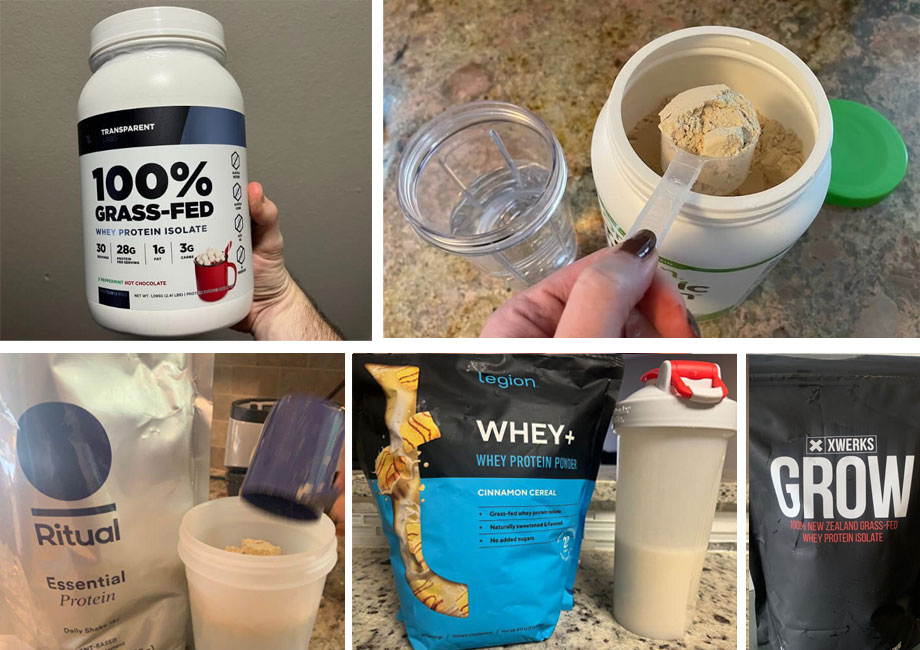We test and review fitness products based on an independent, multi-point methodology. If you use our links to purchase something, we may earn a commission. Read our disclosures.
Diabetes1 is a complex metabolic disorder characterized by elevated blood sugar (glucose) levels due to secretion and action issues with insulin or the hormone that helps blood sugar enter the body’s cells for energy. There are various types of diabetes, but the primary ones are types 1 and 2.
I’ll focus on Type 2 diabetes, which is more prevalent and largely preventable, unlike Type 1 diabetes. Type 2 diabetes is primarily linked to poor lifestyle and dietary habits, yet manageable by adhering to an exercise regimen and a healthy diet. Although dietary advice for individuals with diabetes2 should be individualized, protein is integral for blood sugar and weight management.
So, enter the best protein powders for diabetics, offering numerous benefits I’ll discuss in full below. Although protein powders should only supplement an already balanced diet, they can be as convenient and trustworthy as the best diabetic meal delivery services.
As a registered dietitian, I collaborated with our expert product testers to evaluate the best protein powders so we could narrow our top choices for managing diabetes. Here’s what we considered:
- Formulation: Is protein the primary component? Is the product low in sugar and carbs to avoid blood sugar spikes?
- Third-party testing: Can we trust the label’s accuracy and product purity?
- Taste: Is it enjoyable with flavor options to choose from?
- Price per serving: Does the cost align with market standards, or does it offer good value for the price?
Ready to balance your blood sugar while boosting your protein intake without sacrificing quality or value? Let’s explore our top picks for the best protein powders for diabetes!
Medical disclaimer: This article is intended for educational and informational purposes only. It is not intended as a substitute for medical advice. For health advice, contact a licensed healthcare provider.
Best Protein Powder for Diabetics
- Best Protein Powder for Diabetics Overall: Transparent Labs 100% Grass-Fed Whey Isolate
- Best-Tasting Protein Powder for Diabetics: XWERKS Grow
- Best Vegan Protein Powder for Diabetics: Ritual Essential Protein 18+
- Best Natural Protein Powder for Diabetics: Legion Whey+
- Best Budget Protein Powder for Diabetics: Nutricost Whey Protein Concentrate
- Best Organic Protein Powder for Diabetics: Orgain Organic Protein Powder
- Best Protein Powder Flavor Options for Diabetics: Jacked Factory Authentic ISO
Best Protein Powder for Diabetics Overall: Transparent Labs 100% Grass-Fed Whey Isolate
Good for: Diabetics seeking a low-sugar, high-quality protein formulation with transparent labeling and several flavor options
Best Overall
Transparent Labs 100% Grass-Fed Whey Protein Isolate
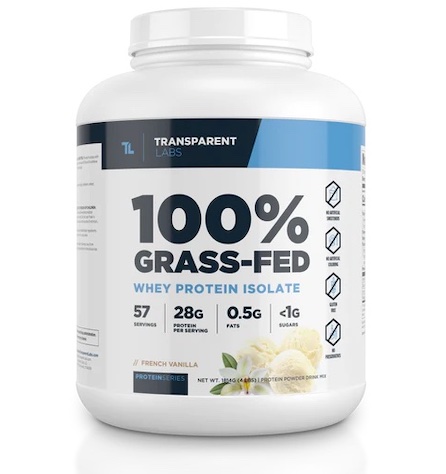
Product Highlights
- High-quality whey protein isolate
- 28 grams of protein per serving
- 15 flavors to choose from
- $1.99 per serving
Pros & Cons
Pros
- High-quality protein
- No artificial sweeteners, food dyes, or preservatives
- Lots of flavors to choose from
- Good customer reviews
- Whey isolate may be easier to digest for some people
Cons
- Price per serving on the high end
Bottom Line
Our testers love Transparent Labs 100% Grass-Fed Whey Protein Isolate because we know exactly what's in it, and almost every flavor we've tried is a 5 out of 5 on taste. Yes, it's a little more expensive than other protein powders but you get what you pay for.
As a low-sugar, high-protein option with 5-star ratings across the board, Transparent Labs 100% Grass-Fed Whey Isolate stands out as the best protein powder for diabetics. While you can find more detailed information in our Transparent Labs Protein review, let’s highlight the key benefits of this high-quality protein powder for individuals managing blood sugar levels and other dairy drinkers.
The most notable ingredient is its grass-fed whey protein isolate, delivering 28 grams of pure protein per scoop, complete with all the essential amino acids needed from dietary sources. A 2023 review3 suggests that high-quality whey may help manage type 2 diabetes by controlling postprandial hyperglycemia (post-meal blood glucose levels) and improving insulin sensitivity, how well cells respond to insulin. Whey protein may also help prevent cardiovascular disease, a major risk of diabetes, by improving blood lipid (fat) levels, including cholesterol.
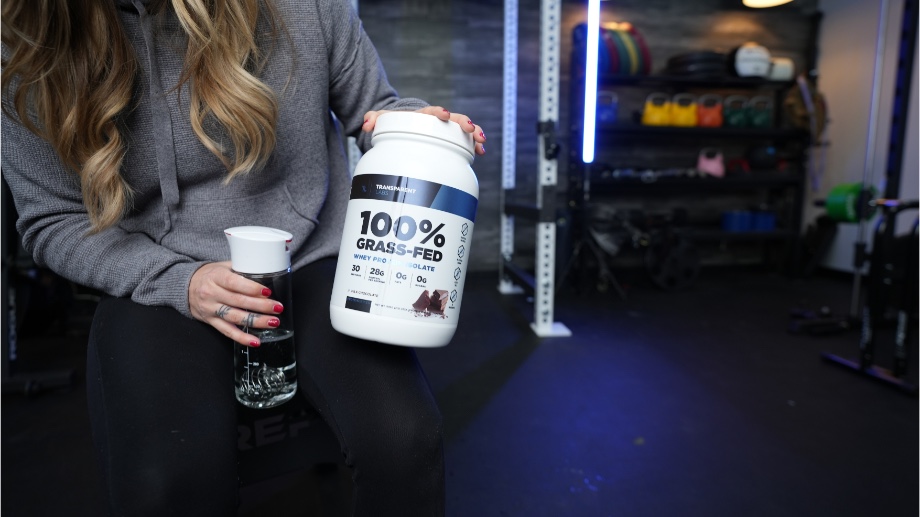
Whey protein isolates are filtered to contain more protein and fewer carbs, fats, and lactose than concentrates, making them an excellent choice for people with diabetes who are lactose intolerant or have dairy sensitivities. Transparent Labs’ product is free from added sugars, artificial sweeteners, coloring, and preservatives and includes natural ingredients like cocoa powder, stevia, and peanut flour, depending on the flavor.
GGR Performance Editor Anthony O’Reilly, a certified personal trainer and nutrition coach, sampled the Peppermint Hot Chocolate flavor and praised its authentic taste. Though he wished for whipped cream and marshmallows, he found it delightful, awarding it a flawless 5-star rating for flavor. We also appreciate the absence of added sugars and fats to maintain blood sugar balance.
Transparent Labs’ Whey Isolate is Informed-Choice and Informed-Protein certified, meaning it undergoes rigorous third-party testing to ensure the label matches the contents and is free from banned substances—a critical factor for athletes. You can even view its Certificates of Analysis and Composition, underscoring its perfect 5-star rating in this category.
| Price per serving | $2.00 |
| Protein content | 28 g |
| Carbohydrate content | 0-3 g |
| Fat content | 0.5-2.5 g |
| Flavor(s) | Blueberry Pancakes, Chocolate Peanut Butter, Cinnamon French Toast, Dark Chocolate, French Vanilla, Milk Chocolate, Mint Chocolate Chip, Mocha, Oatmeal Chocolate Chip Cookie, Peanut Butter, Strawberry Milkshake, Sugar Cookie, Unflavored, Vanilla Peanut Butter |
Best-Tasting Protein Powder for Diabetics: XWERKS Grow
Good for: Increasing daily protein intake while balancing blood sugars and savoring classic, satisfying flavors
Best-Tasting
XWERKS Grow
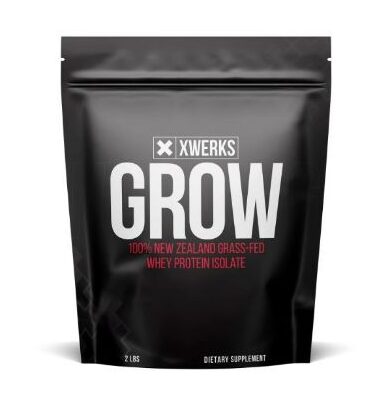
Product Highlights
- Natural, healthy, convenient, and tasty way to get protein
- Uses a microfiltration process to preserve critical biological nutrients in raw whey
- Removes unwanted fats and carbohydrates
- All flavors are naturally sweetened
- Nicely flavored, easily digested, and low-carb protein powder
- Promotes muscle growth and repair
Pros & Cons
Pros
- Keto-friendly
- Naturally sweetened
- Sourced from naturally raised grass-fed cows
- Has a smooth and creamy taste
- Soy- and gluten-free
- Convenient
Cons
- Expensive
Bottom Line
XWERKS Grow whey protein isolate provides a solid blend of amino acids, vitamins, and minerals in a whey protein isolate. Our testers have said this is one of the best-tasting protein powders they've tried, and they've had more than 100.
The quality and taste of a protein powder are equally important, and XWERKS Grow Whey Protein delivers on both fronts. This is especially noteworthy for individuals with type 2 diabetes, who often experience food cravings4: protein helps curb these cravings and enhances satiety, aiding in balanced blood sugar levels—a win-win situation, but we’re just getting started.
XWERKS Grow offers four classic flavors—Chocolate, Peanut Butter, Strawberry, and Vanilla. While the selection might seem limited, quality over quantity rings true: All flavors are naturally sweetened and flavored with ingredients like cocoa and vanilla beans. However, they contain xanthan gum, which might cause digestive issues for some consumers.

Our expert product tester, Anthony, sampled the Chocolate flavor and was thoroughly impressed. “Remember those nostalgic Yoo-hoos? Yeah, it’s like protein-chocolaty goodness!” He notes that XWERKS Grow stands out with its delectably smooth texture among the many protein powders he’s tried. So, it’s no surprise that XWERKS also earns perfect 5s for both taste and solubility.
RELATED: Best-Tasting Protein Powder
The accolades don’t stop there. XWERKS Grow also scores a perfect rating for its formulation. This grass-fed whey protein isolate provides 25 grams of protein per scoop and over 6 grams of branched-chain amino acids (BCAAs). While BCAAs are primarily known for promoting muscle growth, they can also help improve postprandial hyperglycemia3.
Despite the rave reviews, one downside is that XWERKS Grow is not third-party tested. While we don’t necessarily consider XWERKS lesser because of this, we prioritize third-party-tested products, especially for athletes subject to drug testing.
| Price per serving | $1.97 |
| Protein content | 25 g |
| Carbohydrate content | 1-2 g |
| Fat content | 0-2 g |
| Flavor(s) | Chocolate, Peanut Butter, Strawberry, Vanilla |
Best Vegan Protein Powder for Diabetics: Ritual Essential Protein 18+
Good for: Vegetarian and vegan dieters seeking a vanilla plant-based protein with minimal sugars and carbs
Best Vegan
Ritual Essential Protein Daily Shake 18+
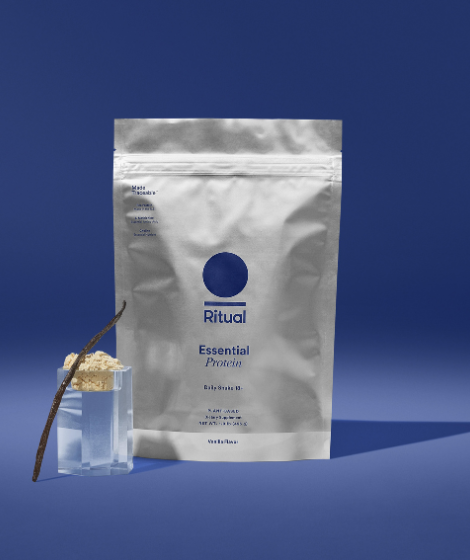
Product Highlights
- Organic pea protein powder
- 20 g of protein per serving
- Formulated to support adults 18-49
- Third-party tested
- 150 mg of choline per serving
Pros & Cons
Pros
- Soy-free, gluten-free, and vegan-friendly
- No artificial sweeteners
- Complete amino acid profile
- Non-GMO
- USA-grown peas
Cons
- Only comes in one flavor
- Price per serving is on the high end
Bottom Line
Ritual’s Essential Protein Daily Shake 18+ is specifically designed for 18-to-49 year-olds with 20 grams of protein per serving and 150 milligrams of chlorine (to support brain and nervous system function). This protein powder from Ritual is third-party tested and Informed Sport Certified, which means this formula has been screened for over 250 banned substances.
High-quality proteins aren’t just about whey; Ritual’s vegan blend is a prime example. While many plant-based, high-protein foods are rich in carbs, Ritual Essential Daily Shake 18+ stands out as a lean protein source—let’s dive into the details.
Each serving packs a punch with 20 grams of organic pea protein and 400 milligrams of L-methionine, an essential amino acid often missing in pea protein5. This clever addition ensures you get a complete protein, and Ritual goes a step further by including choline6 to boost methionine levels even more.
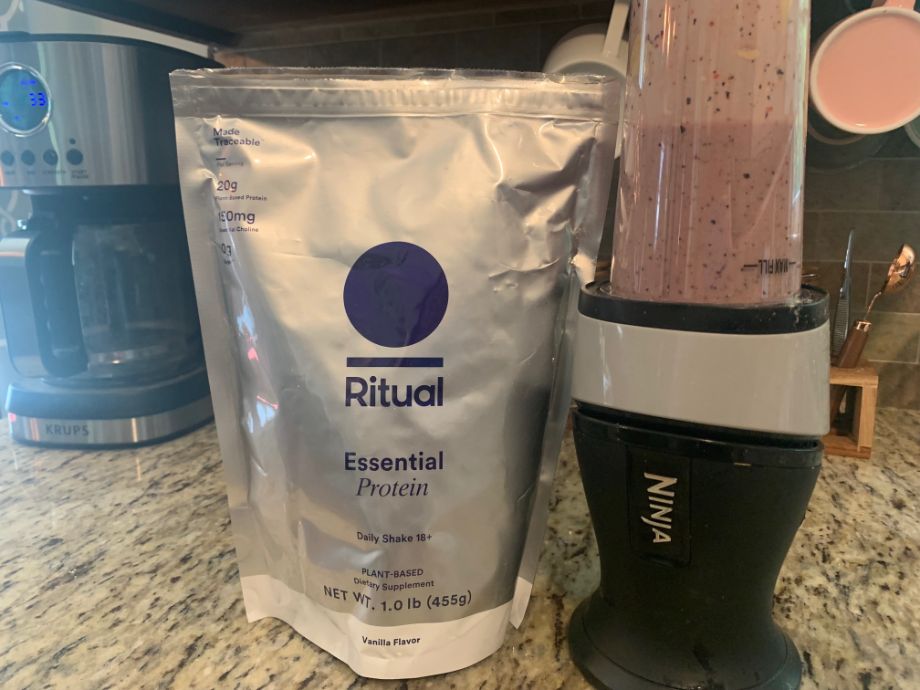
Unlike dairy proteins, which often lack fiber, this pea protein powder provides 3 grams of dietary fiber to support blood sugar balance, heart health, and digestion. Using non-nutritive sweeteners, including monk fruit, enhances its palatability without affecting blood sugar levels.
RELATED: Plant-Based Protein Powder vs Whey
Regarding taste, GGR Senior Director of Content Kate Meier, a certified personal trainer, USA Weightlifting L-1 coach, and Crossfit L-1 coach shares her experience: “I tried Ritual in a couple of ways: first by blending it with water and then mixing it into a berry smoothie. When mixed with water, there’s a slightly chalky aftertaste, but the overall flavor is surprisingly pleasant and not overly hempy or plant-like, unlike other plant-based proteins I’ve encountered. In a smoothie with blueberries and strawberries, the taste is present but not overpowering. Overall, I’m impressed with its flavor.” While vegan proteins might not suit everyone, Ritual earns a solid 4 out of 5 for taste and solubility.
Ritual also gets 5 stars for being third-party tested by Informed-Sport, ensuring that what you see is what you get and that athletes can be confident it’s free from banned substances. We appreciate its transparency, as it displays the origin of each ingredient.
Learn more about this high-quality, plant-forward formulation in our Ritual Protein Powder review.
| Price per serving | $2.66 |
| Protein content | 20 g |
| Carbohydrate content | 3 g |
| Fat content | 2 g |
| Flavor(s) | Vanilla |
Best Natural Protein Powder for Diabetics: Legion Whey+
Good for: Those who prioritize all-natural formulations without compromising flavor options
Best Natural
Legion Whey+
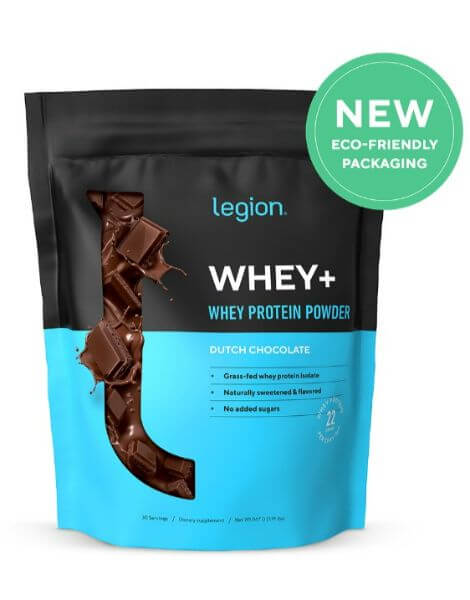
Product Highlights
- Sourced from small dairy farms in Ireland
- Over 5 g of BCAAs per serving
- Non-GMO and animal welfare approved
- Third-party tested for banned substances
Pros & Cons
Pros
- Low in carbs and fat
- Natural ingredients
- Money-back guarantee
- Made with ethically-sourced milk
- Lots of flavor options
Cons
- Comparably high cost per serving
- May be clumpy when mixed
- Some flavors have mixed reviews
Bottom Line
Legion Whey+ is a clean, sustainable protein powder that also is macro-friendly and a great option for anyone looking for a clean protein supplement. Many of our testers have brought this with their own money because they love the taste and easy mixability.
In most ways, Legion Whey+ is the epitome of natural purity in protein supplements. While our comprehensive Legion Whey Protein review delves into all its glory, let’s highlight its standout qualities.
First, each scoop of Legion Whey+ delivers over 20 grams of whey protein isolate, free from “artificial junk” (Legion’s words, not mine). Legion swaps artificial flavors, sweeteners, preservatives, and fillers with natural flavors, Stevia leaf extract, sea salt, and a perfect 5 formulation score.
Legion Whey+ also boasts impressive certifications, earning a perfect 5 for third-party testing. It holds a Labdoor Tested for Purity certification, ensuring rigorous testing for harmful and banned substances. You’ll also notice its Truly Grass-Fed certification, guaranteeing that the cows producing the dairy for the whey protein isolate are exclusively grass-fed (no corn or soy added) and spend most of their time grazing in Ireland’s pastures.
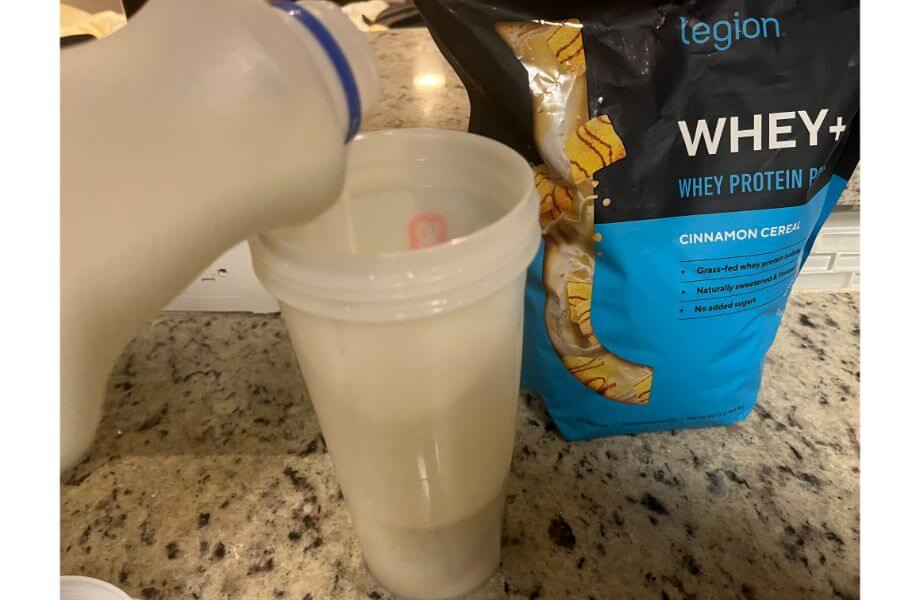
While the nutritional benefits of grass-fed whey may not significantly surpass those of grain-fed whey, the taste certainly does, based on anecdotal evidence from GGR’s expert testers. Anthony sampled the Cinnamon Cereal flavor, returning him to a childhood favorite, Cinnamon Toast Crunch. “While that cinnamon spice didn’t quite hit as nice as that last bit of CTC at the bottom of the bowl, the flavor is definitely noticeable,” he says, ultimately rating Legion Whey+ a 4.5 out of 5 for taste and a perfect 5 for solubility.
If cinnamon isn’t your bowl of cereal, Legion Whey+ offers 15 more low-sugar flavors, ranging from Banana Bread to Cookies & Cream to Salted Caramel. Increase your protein intake and balance your blood sugar with a sippable Salted Caramel? We’re in!
| Price per serving | $2.00 |
| Protein content | 22-24 g |
| Carbohydrate content | 2-6 g |
| Fat content | 1-2 g |
| Flavor(s) | Apple Pie, Banana Bread, Birthday Cake, Chocolate Hazelnut, Chocolate Peanut Butter, Cinnamon Cereal, Cocoa Cereal, Cookies & Cream, Dutch Chocolate, French Vanilla, Fruity Cereal, Honey Cereal, Mocha Cappuccino, Salted Caramel, Strawberry Banana, Unflavored |
Best Budget Protein Powder for Diabetics: Nutricost Whey Protein Concentrate
Good for: Anyone looking for a low-carb, high-protein option without breaking the bank
Best Budget
Nutricost Whey Protein Concentrate
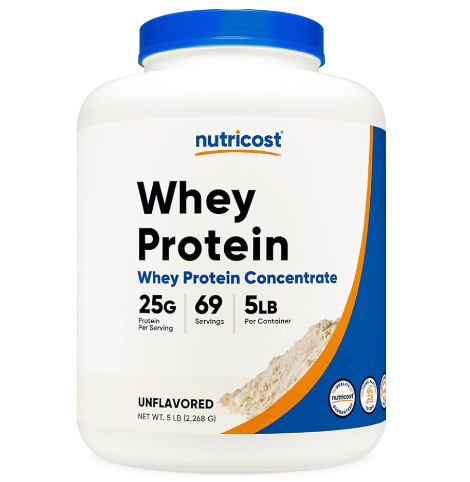
Product Highlights
- 25 grams of whey protein concentrate per serving
- Available in 5 flavors, including unflavored
- High-quality ingredients and third-party testing
- Supports lean muscle growth and recovery after workouts
Pros & Cons
Pros
- Non-GMO and gluten-free
- Manufactured in GMP-compliant facility
- Unflavored option only contains one ingredient, instantized whey protein concentrate
Cons
- Whey concentrate may not mix as well as whey isolate
- Flavored options are higher in calories than other whey proteins
Bottom Line
Nutricost Whey Concentrate contains 25 grams of high-quality whey protein concentrate, available in five flavors. It's gluten-free, non-GMO, manufactured in a GMP-compliant facility, and third-party tested.
If you’re looking for a low-sugar, budget-friendly protein option that won’t break the bank or cause blood sugar spikes, Nutricost Whey Protein Concentrate might suit you. Its price starts at $0.74 per serving on Amazon, earning a perfect 5 for price without compromising value.
The Unflavored Nutricost Whey Protein Concentrate is as simple as it gets, containing only two ingredients: 25 grams of whey protein concentrate per serving and sunflower lecithin (an emulsifier that helps stabilize mixtures). While whey protein concentrate isn’t as lean as protein isolates, it’s still rich in essential amino acids (EAAs) and branched-chain amino acids (BCAAs). Depending on the flavor, Nutricost Whey Protein Concentrate contains a maximum of three grams of carbs and fat.
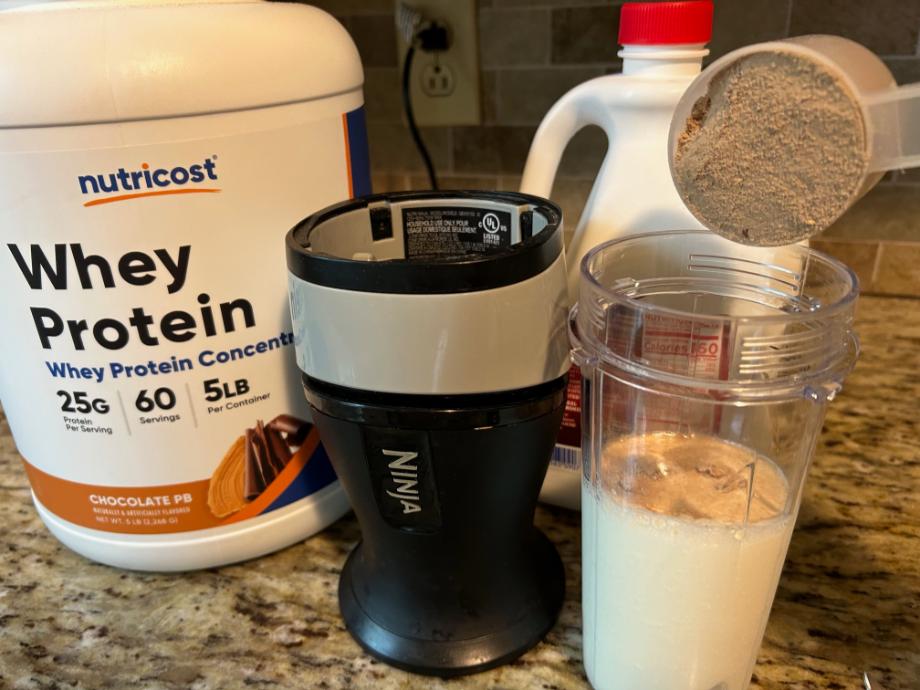
However, there is a trade-off to consider. The Unflavored option earns a perfect 5-star rating, but we deducted flavored options to 4 out of 5 due to the inclusion of the artificial sweetener sucralose. The chocolate flavor also contains acesulfame potassium. While these sweeteners are generally safe for diabetics, they may cause digestive upset in some consumers.
If you’re tolerant of artificial sweeteners, you might agree that the flavored options deserve a perfect 5-star rating for taste. Kate reluctantly tried the Chocolate Peanut Butter flavor as a non-peanut butter lover. She was pleasantly surprised, telling us, “I didn’t expect to truly enjoy this! The peanut butter comes through in all the right ways, allowing the chocolate to still make a delicious appearance.”
As for third-party testing, Nutricost Whey Protein Concentrate receives a 4 out of 5 rating. Although it undergoes independent testing for purity and safety, Nutricost isn’t transparent about which lab conducts the tests.
Check out our in-depth Nutricost Whey Protein Concentrate review for more information.
| Price per serving | $0.74-$1.83 |
| Protein content | 25 g |
| Carbohydrate content | 1-3 g |
| Fat content | 3 g |
| Flavor(s) | Chocolate, Chocolate Peanut Butter, Strawberry Milkshake, Vanilla, Unflavored |
Best Organic Protein Powder for Diabetics: Orgain Organic Protein Powder
Good for: Those who value organic, plant-based ingredients and welcome some natural carbs and fats in their supplements
Best Organic
Orgain Organic Protein Powder
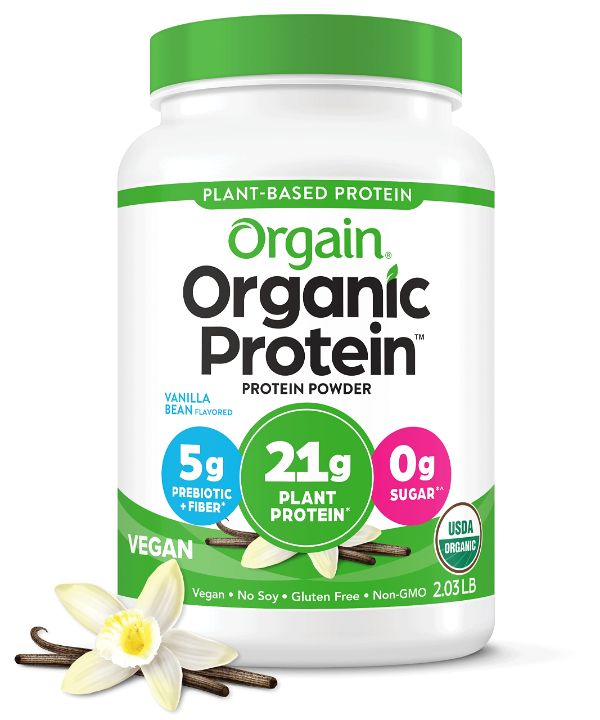
Product Highlights
- Multi-source vegan protein powder
- USDA organic, non-GMO, dairy-free, kosher, and no artificial ingredients
- 21 grams of protein per serving
Pros & Cons
Pros
- Wide variety of flavors, including seasonal options
- Under $2 per serving
- Coffee flavor with caffeine
Cons
- Only 21 grams of protein per serving
- Some reviewers found flavors too sweet
- Reviewers reported upset stomach
Bottom Line
Orgain protein doesn’t have as much protein per serving as its competitors, but it has the widest variety of flavors. Some users did experience upset stomachs after using the protein.
“Organic” describes the method of processing ingredients, and for Orgain’s Certified USDA Organic protein powder, its produce is grown without prohibited substances, such as synthetic fertilizers and pesticides. A 2020 systematic review7 suggests that increasing organic food intake can lead to positive health outcomes, including reduced incidences of metabolic syndrome and type 2 diabetes8.
Let’s not forget protein’s crucial role in managing blood sugar levels. Orgain Organic Protein Powder offers 21 grams of protein per serving, sourced from organic pea, chia seed, and brown rice proteins. While it may contain up to 16 grams of carbs and fat per serving, which is higher than some other proteins, it’s a solid option as a mini meal replacement. Additionally, it includes prebiotics and dietary fiber to support digestion, blood sugar management, and heart health.
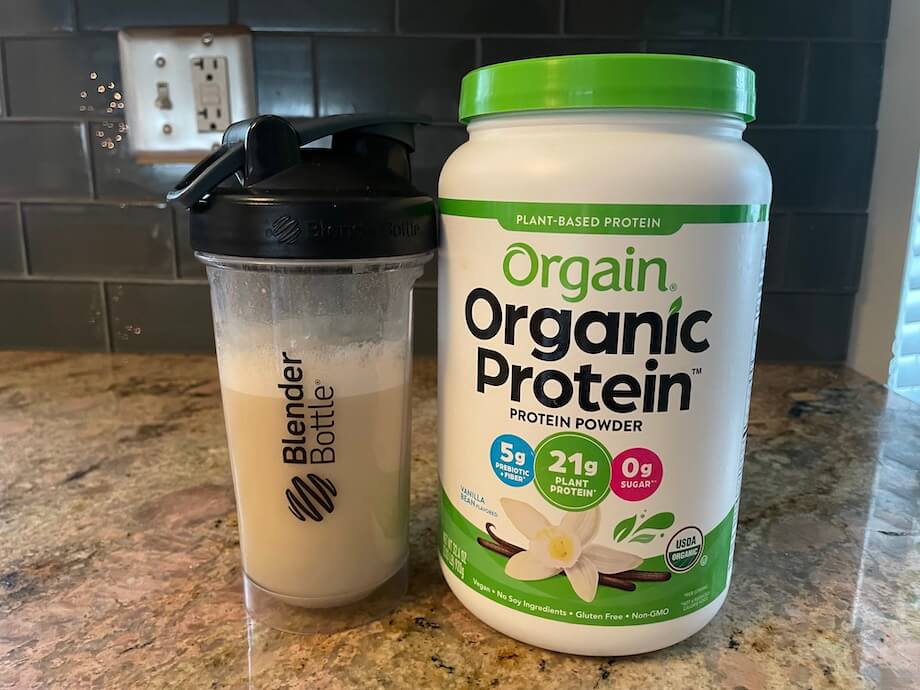
However, the powder also includes gums and erythritol, which may cause digestive distress in some individuals. For instance, Anthony experienced gassiness, leading to a 4 out of 5 rating for side effects and formulation.
Anthony tried the Vanilla Bean flavor and found it true to taste, though not exceptional, and noticed some floaties, which are relatively common with plant-based protein powders. These qualities resulted in a 3.5 out of 5 rating for taste and a 4 for solubility.
Our Orgain Protein Powder Review highlights that while some customers may desire more flavor intensity, it boasts a 4.5 out of 5 rating on Amazon. Orgain’s fans praise its taste, ease of use, and high-quality ingredients.
| Price per serving | $1.90 (for 20-serving container) |
| Protein content | 21 g |
| Carbohydrate content | 7-16 g |
| Fat content | 4-5 g |
| Flavor(s) | Chocolate Caramel Sea Salt, Chocolate Coconut, Chocolate Peanut Butter, Cookies and Cream, Creamy Chocolate Fudge, Iced Coffee, Natural Unsweetened, Peanut Butter, Vanilla Bean, Strawberries and Cream |
Best Protein Powder Flavor Options for Diabetics: Jacked Factory Authentic ISO
Good for: Individuals who need to balance blood sugars and want sweet flavor variety
Best Flavors
Jacked Factory Authentic ISO Grass-Fed Whey Protein
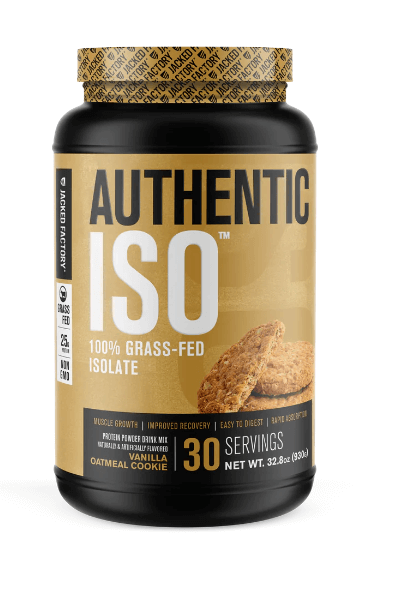
Product Highlights
- Three flavors
- 25g per scoop
- 110 calories per serving
- Under 1g of fat per scoop
Pros & Cons
Pros
- 25g of protein
- Only 110 calories per scoop
- No added sugars
- Under 1g of fat per serving
Cons
- Reviewers state the taste is not the best
- Doesn't mix well
Bottom Line
A protein powder that comes very close to being pure protein, at a reasonable price.
Craving various sweet treats but need to balance your blood sugar levels? Jacked Factory Authentic ISO offers a range of flavors—from Blueberry Muffin to Cinnamon French Toast to Cookies and Cream—while being a low-carb and low-sugar option. Let’s bite into this whey protein isolate’s sweet details.
Let’s do a comparison for funsies: A 31-gram blueberry muffin contains around 500 calories, 16 grams of carbs, 10 grams of sugar, 5 grams of fat, and 1 gram of protein. On the other hand, a 30.4-gram scoop of Jacked Factory’s Blueberry Muffin flavor delivers only 110 calories, 0.5 grams of fat, 1 gram of carb, and a whopping 25 grams of protein—that’s 25 times more protein than the muffin! While indulging in a blueberry muffin is perfectly fine (unless medically-advised otherwise), enjoying it in moderation is essential to maintain balanced blood sugar levels and overall health.
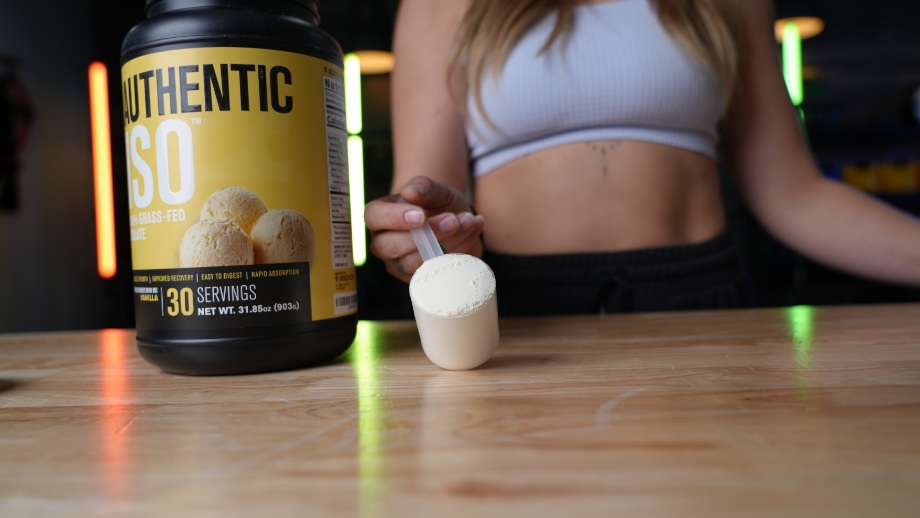
Anthony tried the Vanilla flavor and rated it 4 out of 5, noting its slightly oversweet flavor and good solubility. He couldn’t detect the stevia extract among its tidy ingredients list, but the artificial sweetener sucralose likely contributed to the intense sweetness he experienced.
Additionally, Jacked Factory offers “Post” in Oatmeal Chocolate Chip and Vanilla, among other ISO flavors. Alongside 25 grams of protein, these options include 3,000 milligrams of creatine monohydrate and 2,500 milligrams of betaine anhydrous for post-workout recovery. While it may be a solid option for some, others may solely want the flavor variety and protein that comes with it.
Although Jacked Factory’s whey protein isolate is not third-party tested, it is manufactured in the U.S. in a cGMP (Current Good Manufacturing Practice) and FDA-registered facility, ensuring a high-quality standard. Check out our in-depth Jacked Factory Authentic ISO Whey review for more information.
| Price per serving | $1.33 |
| Protein content | 25-27 g |
| Carbohydrate content | 0-2 g |
| Fat content | 0.5-1 g |
| Flavor(s) | Blueberry Muffin, Chocolate, Chocolate Peanut Butter, Cinnamon French Toast, Cookies & Cream, Peanut Butter, Unflavored; Post (Oatmeal Chocolate Chip, Vanilla) |
Other Protein Powders for Diabetics We Researched
To keep our recommendations concise, we narrowed down our top picks for people with diabetes. However, several others we think fit the bill, including many of the best sugar-free protein powders:
- Kaged Whey Protein Isolate: This low-calorie whey protein isolate includes digestive enzymes to aid protein absorption and contains no artificial sweeteners.
- Dymatize ISO-100: A sugar-free, easy-to-digest hydrolyzed whey protein available in notoriously sweet flavors like Fruity Pebbles, Cocoa Puffs, and Dunkin’ Glazed Donut.
- Transparent Labs Casein: A dairy-based casein protein that may help prolong satiety and stabilize blood sugar levels, but its thick texture may not suit everyone.
- Garden of Life Sport: This third-party tested and certified organic vegan powder provides 30 grams of lean protein and 5.5 grams of BCAAs, but other plant-based options deliver a more enjoyable taste.
How We Picked the Best Protein Powders for Diabetics
Choosing the best protein powders for diabetics requires a comprehensive approach, and we lean on our trusty GGR supplement testing methodology to make our selections. Here’s how we picked our top picks:
Protein Content and Source
The primary ingredient in any protein powder should be, unsurprisingly, protein. We aim for a minimum of 20 grams per serving, ensuring you get a substantial amount with each use. We also incorporated a variety of protein sources, such as plant-based and whey protein powders, to accommodate diverse dietary restrictions and preferences.
Sugar Content
Protein powders can have varying sugar levels, with dairy-based options typically having less and plant-based powders often having more. Our selection prioritizes products with minimal added sugars, making them safe and effective for managing blood sugar levels.
Flavor
While formulation is essential, it doesn’t mean much if it isn’t palatable and enjoyable. Our top picks feature a range of flavors to cater to different preferences, from classic Chocolate to nostalgic Cinnamon Toast Crunch.

Solubility
Solubility, or how well a protein powder mixes with liquid, is essential for a smooth, enjoyable protein shake. We prioritize products that dissolve effortlessly, ensuring a smooth texture without lengthy mixing—perfect for on-the-go convenience when you don’t have a blender handy.
Cost
Cost shouldn’t be a barrier to increasing daily protein intake. That’s why we offer a variety of products that cater to different budgets, ensuring you can meet your protein needs without compromising quality or value.
Customer Reviews and Experience
While the GGR team rigorously tests and reviews every product we recommend, we also consider customer feedback. We analyze reviews from third-party sites like Amazon to maintain objectivity and reduce potential biases from brand sites.
Benefits of Protein Powders for Diabetics
Protein powders offer numerous benefits for diabetics, ranging from blood sugar management to delightful versatility. Here are the key advantages:
- Blood sugar management: Protein has minimal impact on blood sugar responses2, making it a reliable option for those monitoring their glucose.
- Convenience: High-protein foods should form the core of your diet, but protein powders offer unmatched convenience to meet daily protein needs.
- Versatility: Protein powder isn’t just for protein drinks; you can mix it into oats, bake it into muffins, or blend it into smoothies. Its versatility allows you to get creative with your recipes.
- Portion control: Even if you don’t measure the exact serving size, using a level scoop of protein powder will keep you close to the recommended portion, helping you manage your intake effectively.
- Muscle growth: Protein helps build muscle mass when coupled with resistance training9, and less muscle mass is associated with greater insulin resistance and type 2 diabetes risk10.
- Weight loss: High-protein diets promote feelings of fullness, reducing the likelihood of overeating and aiding weight loss. Evidence11 shows even losing a modest five percent of body weight can improve insulin sensitivity.
Dosing and Interactions
The amount of protein individuals with diabetes need varies based on many factors, such as weight loss goals and kidney health. Here are some evidence-based guidelines12:
- Individuals with diabetes without comorbidities: Aim for at least 1 gram of protein per kilogram (g/kg) of body weight.
- People with diabetes and chronic kidney disease (CKD): Target 0.8 to 1 g/kg of body weight
- Individuals with diabetes and normal kidney function pursuing weight loss: Aim for 1.5 to 2 g/kg of body weight.
Also, ensure protein powders do not negatively interact with other supplements or medications. Healthcare professionals, such as doctors and registered dietitians, can help you make informed decisions and provide personalized recommendations based on your health status and goals.
Third-Party Testing
Since dietary supplements, including protein powders, aren’t strictly regulated by the FDA, we prioritize products that have undergone third-party testing or provide transparent labeling with precise ingredient amounts. This ensures the product matches its label and is free from harmful substances.
What To Look For in Protein Powders for Diabetics
When choosing the best protein powder for diabetes, consider several factors to ensure it aligns with your health goals and dietary restrictions. Here’s a quick tip guide to help you make an informed decision that supports your nutritional needs and fits seamlessly into your lifestyle.
Formulation
The formulation of protein powders can vary significantly, so keep these important factors to keep in mind:
- Carbohydrate and sugar content: Protein powders with low carbohydrate and sugar content are best for maintaining stable blood sugar levels.
- Dietary allergens and intolerances: Whey isolates may work for you with lactose intolerance. However, plant-based protein powders are the safest choice if you have severe dairy intolerance or allergies. Always check ingredient labels meticulously to avoid common allergens like soy, peanuts, and tree nuts.
- Sodium content: Pay attention to the sodium content, especially if you need to monitor your levels due to heart or kidney conditions.
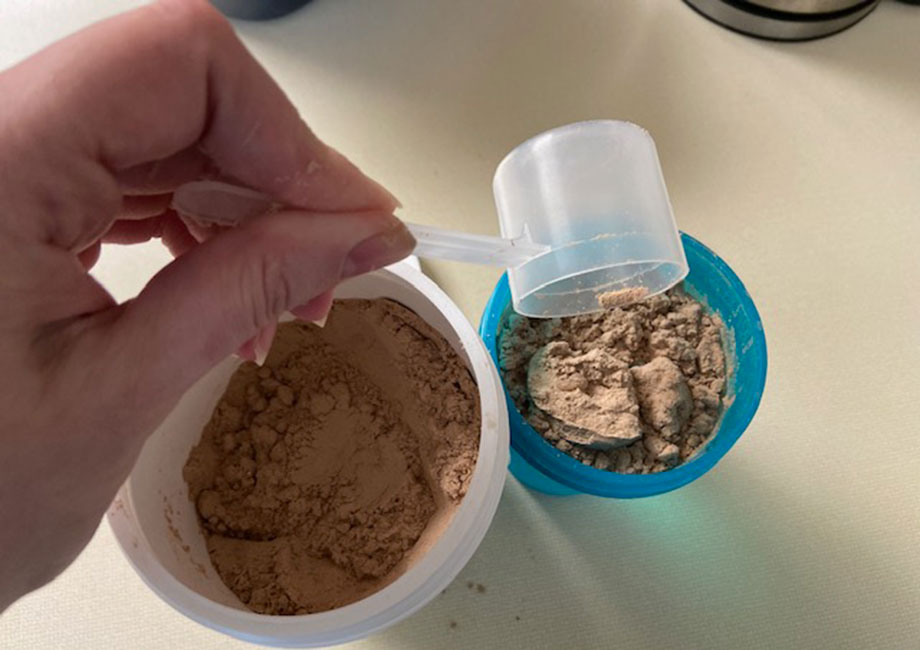
RELATED: Best Lactose-Free Protein Powder
Flavor
The flavor is vital in ensuring you use your protein powder consistently, so choose a flavor you enjoy and suits your intended use. For regular consumption from a shaker bottle, go for flavors with high solubility and appeal to you. Traditional flavors, like vanilla, and unflavored options might be the best choice if you mix the powder into smoothies, oatmeal, or other recipes.
Price
Consider how protein powder fits your overall health expenses, including blood sugar monitoring strips.
Third-Party Testing and Certifications
Look for protein powders that are third-party tested and have certifications relevant to your dietary needs. Certifications provide an extra layer of assurance about the product’s quality and safety. For instance, if you have celiac disease, ensure the product is certified gluten-free.
Experts Who Contributed to This Article
Protein Powders for Diabetics: FAQs
What is the best protein powder for diabetics?
When choosing the best protein powder for diabetics, it’s essential to consider individual dietary restrictions, preferences, and nutritional needs. Here are some of our top recommendations:
– Best Protein Powder for Diabetics Overall: Transparent Labs 100% Grass-Fed Whey Isolate
– Best-Tasting Protein Powder for Diabetics: XWERKS Grow
– Best Vegan Protein Powder for Diabetics: Ritual Essential Protein 18+
– Best Natural Protein Powder for Diabetics: Legion Whey+
– Best Budget Protein Powder for Diabetics: Nutricost Whey Protein Concentrate
– Best Organic Protein Powder for Diabetics: Orgain Organic Protein Powder
– Best Protein Powder Flavor Options for Diabetics: Jacked Factory Authentic ISO
Should diabetics take protein powder?
Most people, including people with diabetes, don’t need to take protein powder if they already get enough protein from their food. However, protein powder can be a convenient and versatile way to supplement your diet, helping you meet your daily protein requirements more easily.
Which protein does not spike insulin?
Low-carb, lean options—like meats and seafood—are ideal when choosing sources of protein that don’t significantly spike insulin. Dairy and plant-based proteins may cause a slight, manageable blood sugar response if consumed in moderation and without added sugars.
What protein lowers blood sugar?
While protein itself doesn’t directly lower blood sugar levels, it plays a crucial role in managing them. This essential macronutrient helps slow the glycemic response, especially when consuming carbohydrates, which can prevent rapid spikes in blood sugar.2 Opting for lean protein sources—such as animal meats, eggs, and fish—ensures minimal impact on blood sugar levels.
These statements have not been evaluated by the Food and Drug Administration. This product is not intended to diagnose, treat, cure, or prevent any diseases.
References
- Sapra A, Bhandari P. Diabetes. 2023 Jun 21. In: StatPearls [Internet]. Treasure Island (FL): StatPearls Publishing; 2024 Jan–. PMID: 31855345. Available from: https://pubmed.ncbi.nlm.nih.gov/31855345/
- Reynolds A, Mitri J. Dietary Advice For Individuals with Diabetes. [Updated 2024 Apr 28]. In: Feingold KR, Anawalt B, Blackman MR, et al., editors. Endotext [Internet]. South Dartmouth (MA): MDText.com, Inc.; 2000-. Available from: https://www.ncbi.nlm.nih.gov/books/NBK279012/
- Lesgards JF. Benefits of Whey Proteins on Type 2 Diabetes Mellitus Parameters and Prevention of Cardiovascular Diseases. Nutrients. 2023 Mar 6;15(5):1294. doi: 10.3390/nu15051294. PMID: 36904293; PMCID: PMC10005124.
- Watson NA, Dyer KA, Buckley JD, et al. Reductions in food cravings are similar with low-fat weight loss diets differing in protein and carbohydrate in overweight and obese adults with type 2 diabetes: A randomized clinical trial. Nutr Res. 2018 Sep;57:56-66. doi: 10.1016/j.nutres.2018.05.005. Epub 2018 Jun 5. PMID: 30122196.
- Shanthakumar P, Klepacka J, Bains A, et al. The Current Situation of Pea Protein and Its Application in the Food Industry. Molecules. 2022 Aug 22;27(16):5354. doi: 10.3390/molecules27165354. PMID: 36014591; PMCID: PMC9412838.
- Innis SM, Davidson AG, Melynk S, et al. Choline-related supplements improve abnormal plasma methionine-homocysteine metabolites and glutathione status in children with cystic fibrosis. Am J Clin Nutr. 2007 Mar;85(3):702-8. doi: 10.1093/ajcn/85.3.702. PMID: 17344490.
- Vigar V, Myers S, Oliver C, et al. A Systematic Review of Organic Versus Conventional Food Consumption: Is There a Measurable Benefit on Human Health? Nutrients. 2019 Dec 18;12(1):7. doi: 10.3390/nu12010007. PMID: 31861431; PMCID: PMC7019963.
- Kesse-Guyot E, Rebouillat P, Payrastre L, et al. Prospective association between organic food consumption and the risk of type 2 diabetes: findings from the NutriNet-Santé cohort study. Int J Behav Nutr Phys Act. 2020 Nov 9;17(1):136. doi: 10.1186/s12966-020-01038-y. PMID: 33167995; PMCID: PMC7653706.
- Krzysztofik M, Wilk M, Wojdała G, et al. Maximizing Muscle Hypertrophy: A Systematic Review of Advanced Resistance Training Techniques and Methods. Int J Environ Res Public Health. 2019 Dec 4;16(24):4897. doi: 10.3390/ijerph16244897. PMID: 31817252; PMCID: PMC6950543.
- Haines MS, Dichtel LE, Santoso K, et al. Association between muscle mass and insulin sensitivity independent of detrimental adipose depots in young adults with overweight/obesity. Int J Obes (Lond). 2020 Sep;44(9):1851-1858. doi: 10.1038/s41366-020-0590-y. Epub 2020 May 13. PMID: 32404950; PMCID: PMC7483278.
- Franz MJ. Weight Management: Obesity to Diabetes. Diabetes Spectr. 2017 Aug;30(3):149-153. doi: 10.2337/ds17-0011. PMID: 28848305; PMCID: PMC5556579.
- Hamdy O, Horton ES. Protein content in diabetes nutrition plan. Curr Diab Rep. 2011 Apr;11(2):111-9. doi: 10.1007/s11892-010-0171-x. PMID: 21207203.
Further reading

Many resistance bands look the same and it’s not easy knowing which ones are best for older adults. So check out our best resistance bands for seniors list! Read more
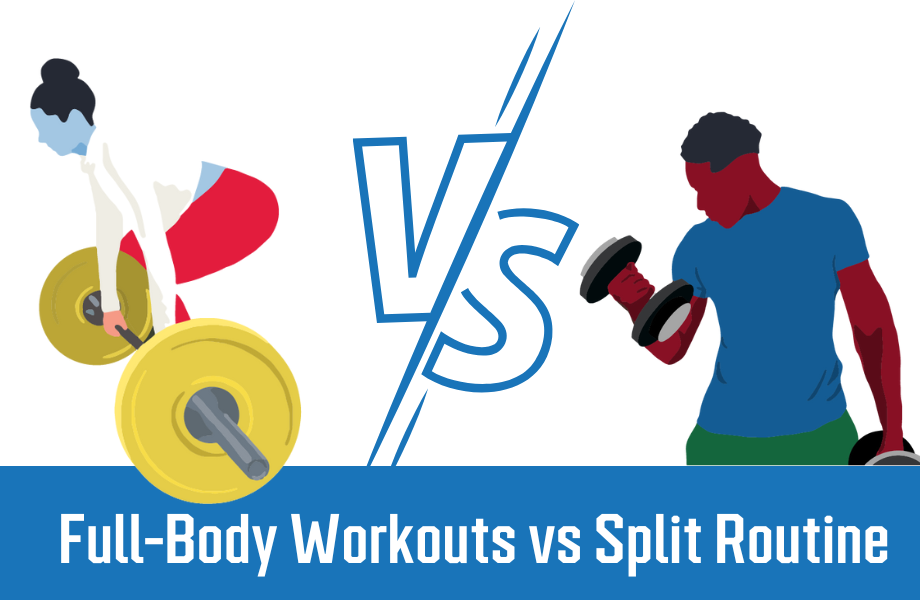
Diabetes1 is a complex metabolic disorder characterized by elevated blood sugar (glucose) levels due to secretion and action issues with insulin or the hormone that helps blood sugar enter the body’s cells for energy. There are various types of diabetes, but the primary ones are types 1 and 2. I’ll focus on Type 2 diabetes, which is more prevalent and largely preventable, unlike Type 1 diabetes. Type 2 diabetes is primarily linked to poor lifestyle and dietary habits, » Read more about: Best Protein Powder for Diabetics 2024: Sweet Solutions, Smooth Shakes, and Steady Sugars » Read more

The Nike Metcons are some of the most popular CrossFit shoes available. With the release of the Nike Metcon 2's, many are asking what the differences are. Here's what we see. Read more

What is progressive overload? We’re glad you asked. In this guide, we’ll explain what it is and how it can help you gain muscle and strength. Read more

